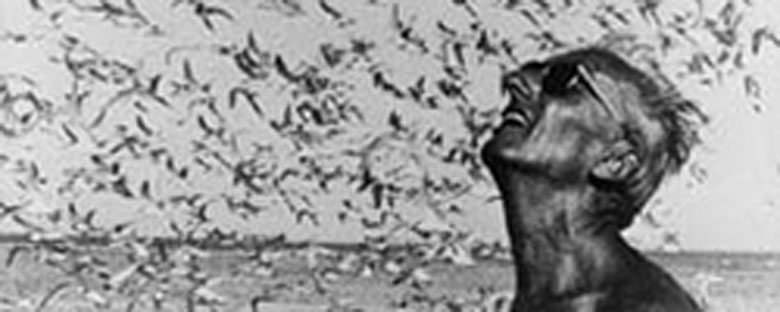Reviews
Jacques Cousteau
USA, 1977
Credits
Review by Leo Goldsmith
Posted on 19 May 2005
Source Warner Bros. DVD
Related articles
Reviews: The Life Aquatic
“Again I enter a world at once familiar and strange, a world of subtle sensory distortions. Here it is easy to believe in myth.” These are the words of Jacques-Yves Cousteau, oceanographer, explorer, author, television personality, and environmentalist, upon reentering his undersea world in The Cousteau Odyssey. This series, which was produced through PBS from 1977 to 1981, is an extension of Cousteau’s lifelong project of education and environmental awareness, but it is also an expansion of the mythology of Cousteau himself.
Every episode of the series demonstrates Cousteau’s affinity for myths and legends. His particular interest in Homer’s wine-dark Mediterranean, his florid voiceover narration, and even the naming of his various boats, aircraft, and vessels (Calypso being the most famous) attest to a flair for the epic, the tragic, and things “that time forgot.” The figure of Cousteau emerges from this series as an explorer in the most old-fashioned sense, almost child-like in his enthusiasm, fascinated by the history of “Man” and his fabled, eternal struggles with the sea. It is this evident curiosity and romanticism that drives the series forward, as the great diver can be heard rhapsodically crooning things like, “Here, like an absent-minded tourist or a refugee fleeing disaster, the past has left its luggage.” With a team of ruddy men in red caps and tight swimwear, a few family members, and the occasional adolescent boy or elderly woman, Cousteau roams the high seas chasing relics of the past, bizarre phenomena, and often chimerical objectives.
In such grandiosely titled episodes such as “Mediterranean: Cradle or Coffin?” and “Time Bomb at Fifty Fathoms,” Cousteau’s adventures are consistently narrated by Theodore Strauss, whose verbose voiceover imparts a suitable amount of gravitas to the series, often intoning about “the final anonymity of the sea.” Along with this narration, there is the cinematography for which Cousteau’s films are well known, which even today has the same peculiar and unsettling power.
What is perhaps most interesting about this series, however, is not Cousteau’s fantastic search for the true site of Atlantis or his daring removal of poisonous chemicals from a sunken vessel, but rather the less obvious dramas that seem to occur off-camera. In particular, there is the strange, spectral presence of Cousteau’s son, Philippe, a key member of the Cousteau team, who was first badly injured in a gyrocopter crash on Easter Island and later killed in a seaplane accident near Lisbon. These events occurred during the filming of The Cousteau Odyssey, though they barely register in the series’ narrative. (The Easter Island incident is briefly dramatized, but treated as an unfortunate mishap; Philippe’s death is only obliquely alluded to in the dedication of two of the episodes.) With the constant documentation of even the most undramatic of nautical maneuvers and undersea explorations, Philippe’s conspicuous absence from much of the series leaves a disquieting lacuna in the grand narrative of the great explorer.
With these narratives submerged in Cousteau’s odyssey of exploration, it is not difficult to see the inspiration for Wes Anderson’s affectionate Cousteau homage. Revisiting the Cousteau films, one can see the attention that Anderson has paid to the conventions of the series, enjoy the sight of the ubiquitous red caps, and chuckle at some of the badly lit, studio-bound demonstrations with maps, charts, and models that Anderson so effectively parodies. But a return to Cousteau’s own work also shows the vast differences between the French diver and Anderson’s Steve Zissou. Cousteau is evidently affable and earnest, still game for a deep-sea dive at age seventy, eagerly debating with experts over wine and cheese below deck. He is more deeply committed to the natural world and the ways of preserving it than Anderson’s self-promoting, pot-smoking Campari-fiend. The Cousteau Odyssey reveals Cousteau, not as a mere tourist of the high seas and purveyor of tall tales and junk science, but a dedicated environmentalist and educator.
While the release of this box set might inspire some to revisit Cousteau’s work, it is nonetheless obvious that Warner has rushed this set through production to exploit the connections with Anderson’s film. The quality of the image and sound are quite terrible, resembling the beaten-up 16mm print that Max Fischer screens in Rushmore. But even if this aspect of the box set will have its value for nostalgia-junkies, the lack of accompanying material in this package does little to extend Cousteau’s commitment to education and awareness. In its meager presentation of twenty-five year-old program, little care is taken to show what discoveries have been made since the time the series was filmed or to demonstrate Cousteau’s true legacy in oceanography and environmental preservation.
We don’t do comments anymore, but you may contact us here or find us on Twitter or Facebook.



